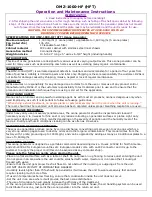
- 66 -
[7] Self-diagnosis and troubleshooting
<Abnormality detected at power on>
Abnormal-
ity display
None
EA
Eb
EC
F1
F2
Meaning of abnormality display and
abnormality troubleshooting
Indoor/outdoor connection erro-
neous wiring, too many indoor
units (5 or more)
1. Outdoor controller board automati-
cally recognizes the number of
connected indoor units. However,
when the number of connected in-
door units cannot be set due to er-
roneous indoor/outdoor connec-
tion, erroneous wiring, etc. even af-
ter 4 minutes have elapsed since
the power was turned on, an ab-
normality is recognized.
2. When the outdoor controller board
identified “5 or more” connected in-
door units, an abnormality is rec-
ognized.
Indoor/outdoor connection erro-
neous wiring
The outdoor controller board auto-
matically sets the unit No. of the in-
door units. However, when the unit
No. of the indoor units cannot be set
due to indoor/outdoor connection er-
roneous wiring even after 4 minutes
has elapsed since the power was
turned on, an abnormality is recog-
nized.
Start-up time over
When start-up processing does not
end even through 4 minutes has
elapsed since the power was turned
on, an abnormality is recognized.
Reverse phase detected
Missing phase detected
Cause
1
Voltage not applied to outdoor unit ter-
minal block TB1.
a. Power supply circuit breaker not
closed.
b. Power supply terminals connection
faulty, or disconnected.
c. Missing phase (R or S phase)
2
No electricity at controller board power
supply connector.
a. Power supply connector contact
faulty.
b. Terminal R/1 or S/2 on controller
board disconnected.
3
Outdoor unit controller board faulty.
a. Blown fuse on controller board.
b. Part faulty.
1
Indoor/outdoor connection wire contact
faulty or erroneous wiring.
2
Indoor/outdoor connection wire diam-
eter or wiring length outside specifica-
tion.
3
Five or more indoor units connected to
outdoor unit.
4
Outdoor controller board send/receive
circuit faulty.
5
Indoor controller board send/receive
circuit faulty.
6
Noise has entered on power supply or
indoor/outdoor connection wire.
1
Indoor/outdoor connection wire contact
faulty, or erroneous wiring.
2
Indoor/outdoor connection wire diam-
eter or wiring length outside specifica-
tion.
3
Outdoor controller board send/receive
circuit faulty.
4
Indoor controller board send/receive
circuit faulty.
5
Noise has entered on power supply or
indoor/outdoor connection wire.
1
Indoor/outdoor connection wire contact
faulty.
2
Indoor/outdoor connection wire diam-
eter or wiring length outside specifica-
tion.
3
Noise has entered on power supply or
indoor/outdoor connection wire.
Power supply reverse phase connection.
Power supply missing phase.
Judgment method and remedy
1
a. Check power supply circuit breaker.
b. Check power supply terminal block
connections.
c. Check power supply terminal block
connections.
2
a. Check power supply connector board
connections.
3
a. Replace fuse.
b. Replace controller board.
(However, when cannot be repaired
even through the check above was
carried out.)
1
Check if indoor unit or outdoor unit in-
door/outdoor connection wire discon-
nected or loose. Also check polarity.
2
Check indoor/outdoor wire diameter and
wiring length.
Outdoor-indoor: Max. 50 m
Indoor-indoor (span): Max. 30 m
Also check that VVF and other flat
cables are connected in S1, S2, S3 or-
der. (S2 in the middle)
3
Check number of indoor units connected
to outdoor unit.
4
Check by turning power off and on.
If abnormality is displayed again, re-
place outdoor controller board or indoor
controller board.
* LED3 of the indoor controller board
flashes when communication is being
performed.
1
Check power supply terminal block con-
nections.
2
Replace controller board
(However, when cannot be repaired
even though check above was carried
out.)
Summary of Contents for PEH series
Page 2: ......















































